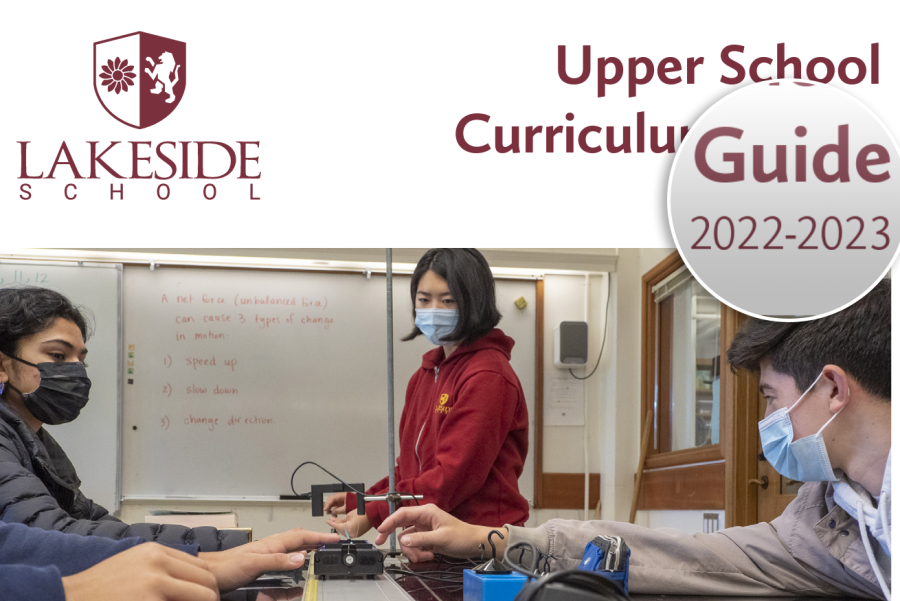Introducing the New STEM Electives
Shedding light on Lakeside’s new courses. (Yu)
As the course signup due date looms, students are scrambling for more information on classes from their friends, teachers, and advisors. But the question remains: what about those mysterious new electives? Never fear—Tatler is here with the scoop on the three new STEM electives!
Data Science
In today’s world, data is everywhere—and everything. Students who signed up for data science can look forward to a course where they can learn the analytical skills required to tackle real data from the real world, in all its messy imperfect glory.
Q: What inspired this course?
A: The smidgen of data analysis in Precalculus classes. The main sequence of high school math classes often doesn’t discuss the sea of data available everywhere because of the internet and fast-growing technology, and this makes it all too easy to misunderstand or misinterpret data.
Q: What will the course look like?
A: Data science will be a largely project-based course, split into little mini-units.
Q: What are some project examples?
A: Some units are still in the works, but examples include COVID data, Washington State housing data, and even astronomical data collected by the newly-launched James Webb telescope!
Q: Is prior experience with statistics recommended for the course?
A: Nope! The course will be accessible regardless of whether or not students have taken statistics. While a typical Statistics course will teach you more about concepts such as random sampling or significance tests, the Data Science course will focus on analyzing data via Python.
Advanced Physics: Modern Physics & Electronics
Ever wondered how time dilation and length contraction really work? Or what the wave-particle duality really is? How about building circuits with Arduinos? Those are all concepts that could be covered in this brand-new Advanced Physics class, says Upper School physics teacher Ms. Erickson.
Q: What inspired this course?
A: Modern physics is just really inspiring. It’s about extremes that we don’t experience in daily life: the really fast or the really small. As for electronics, it can be really satisfying to get circuits working, and a great experience for students seeking to know more about the electronic world they live in.
Q: How does this course differ from the other yearlong physics elective, Advanced Calculus-Based Physics?
A: There’s no calculus requirements for this one. Calc-Based Physics is limited primarily to classical mechanics and electromagnetism, making it a more traditional high-school physics course. On the other hand, this class will be more conceptual in the modern physics units and more hands-on in the electronics units.
Q: Why isn’t this course two separate semester-long physics classes?
A: Many students tend to be looking for yearlong science courses in their senior year, rather than splitting their science selection per semester.
Q: What will this class look like?
The class covers two topics which witnessed major developments in the 20th century and are not typically covered in 10th grade physics. The first half, electronics, will be a project-based unit featuring electromagnetism and circuit design. The second half, modern physics, will cover special relativity and quantum mechanics; students will experiment with simulations and possibly conduct their own research projects.
Advanced Chemistry: Neurochemistry
Having problems finding Organic Chemistry in the 2022-2023 curriculum guide? That’s probably because it doesn’t exist. Instead, reflecting the chemistry department’s changing areas of expertise, Lakeside is offering Advanced Chemistry: Neurochemistry for those seeking to take an advanced chemistry elective. This will be a class where students can learn about the rapidly developing field of neuroscience in combination with advanced topics in chemistry. “To understand how neurons receive, process and send information requires application of principles from physics, chemistry and biology,” says Upper School chemistry teacher Dr. Wardlaw.
Q: What inspired this class?
A: Neurochemistry will be a great way for students to study advanced topics with an interdisciplinary perspective once they have completed their core science classes.
Q: What might be some exciting highlights of this class?
A: I’m excited to synthesize aspirin with students! This was one of the first organic chemistry college labs I remember. Synthesizing a familiar substance gave me this feeling of fresh insight on it.
Q: What might be the biggest challenge for students in this class?
A: One challenge of advanced chemistry is the application of chemical concepts to biological phenomena. Students will practice using concepts they have learned before to better understand those that they may be less familiar with.
Q: What led to the decision to focus on neurochemistry specifically, among all the subfields of chemistry?
A: The focus on neurochemistry actually comes from my academic background: I majored in Neuroscience and minored in Chemistry, and have a PhD in Neurobiology and Behavior. Advanced topics in chemistry can help inform the functioning of a complicated system like a nervous system.
This year’s new advanced math and science courses doubtlessly will help upperclassmen explore more areas of study that interest them. Perhaps the biggest challenge students face now is the paradox of choice: if only we could take eight classes, or even nine…

